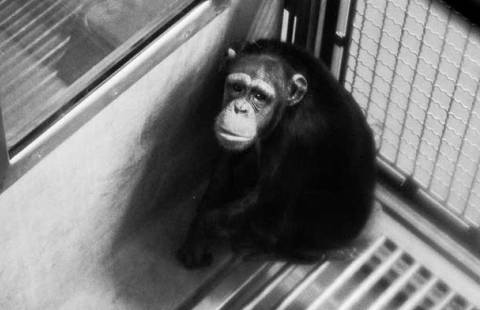After three decades in captivity cooped up in tiny cages, starved of natural light and subjected to gruesome hepatitis and HIV experiments in an Austrian laboratory, a group of 38 were finally released to the new £3million Gut Aiderbichl Animal Sanctuary near Salzburg, Austria , where they can spend the rest of their lives in peaceful retirement.
A television camera operator captured the awe-inspiring moment when the chimpanzees cautiously stepped out of their enclosures and into daylight for the first time in 30 years, embracing one another to celebrate their newfound freedom.
Like prisoners emerging from a lifetime behind bars, a group of chimpanzees step blinking into the sunlight with what appears for all the world to be a wave and a smile. And they have much to be joyful about. This is the first time they have felt grass under their feet and breathed fresh air for 30 years.

Clyde, 30, the chimp tastes freedom for the first time as he emerges from the cages of the ape sanctuary near Vienna

With a wave and what appears to be a smile, chimpanzees step into the daylight for the first time in 30 years at the Gut Aiderbichl Animal Sanctuary, near Salzburg, Austria
These heart-warming images mark the end of a 14-year battle to free the 38 chimps from a lab in Vienna by 59-year-old conservationist Michael Aufhauser. The founder of an animal charity that operates in four European countries, he oversaw the construction of the sanctuary outside Vienna, which is built on the site of a defunct safari park.

What a touching photo! Susi, a 37-year-old chimp, sunbathes in freedom for the first time. Susi has not been outside for 35 years
Michael warned the primates could still be emotionally damaged after their ordeal. He said: “Who knows what scars they carry on the inside.
“They are all traumatised to greater or lesser degrees. Two died before the reserve was finished, but at least those that are left will have a quality of life that was unthinkable when they were prisoners of the lab.
‘Some chimpanzees were infected with the HIV virus. Of course, they became HIV positive. But none of them, not here in Austria or anywhere else in the world, developed full-blown Aids. Therefore, the programme was useless. It achieved absolutely nothing.’
‘At last,’ says Mr Aufhauser. ‘They will have some dignity and some fun for what remains of their lives.’
Some of the chimps were born in the lab so have never known sunlight. Most were kidnapped from African jungles as babies and flown to Europe, where they were locked in metal laboratory cages to be used in a long series of experiments.
The only times they were taken out of their cages was when they were sedated for another experiment.
Horrifyingly, their mothers – who would usually raise them for six years – were all slaughtered.
The aim of the firm that bought them was to find a vaccine to combat Aids. Because chimps share 99 per cent of the gene code of man, they seemed natural subjects for study.
But that meant they suffered terrible cruelties in the years that followed, including being injected with the HIV virus.
Hooked up to machines and pumped full of chemicals, they were truly prisoners of utter despair and hopelessness. Many were driven to the brink of madness and sometimes beyond.
These chimpanzees have not been used in experiments since 1997 when the giant American pharmaceutical company Baxter took over the Austrian laboratory, and immediately halted all tests on the chimps. Its bosses decided the firm had a moral responsibility to improve the life of the chimps.
They were moved to an indoor shelter in a safari park, but when it went into liquidation in 2004 the building of an outdoor sanctuary was stopped and the future of the chimps was in limbo, resulting in them having to spend several more years in cages.
It was believed that the group would be split up and sent to zoos around Europe. But animal advocates around the world, including PETA and its members and supporters, wrote to the Baxter and implored it to ensure that the chimpanzees would be sent to a sanctuary and not be separated from one another.
Thanks to Michael Aufhauser and to those who spoke out, the chimpanzees are now living together happily at an animal sanctuary where they can feel the grass under their feet and the wind on their faces for the first time in decades!
 CY@CY Says Welcome to my dreamscape. Where a Lim is also a Ling.
CY@CY Says Welcome to my dreamscape. Where a Lim is also a Ling.



